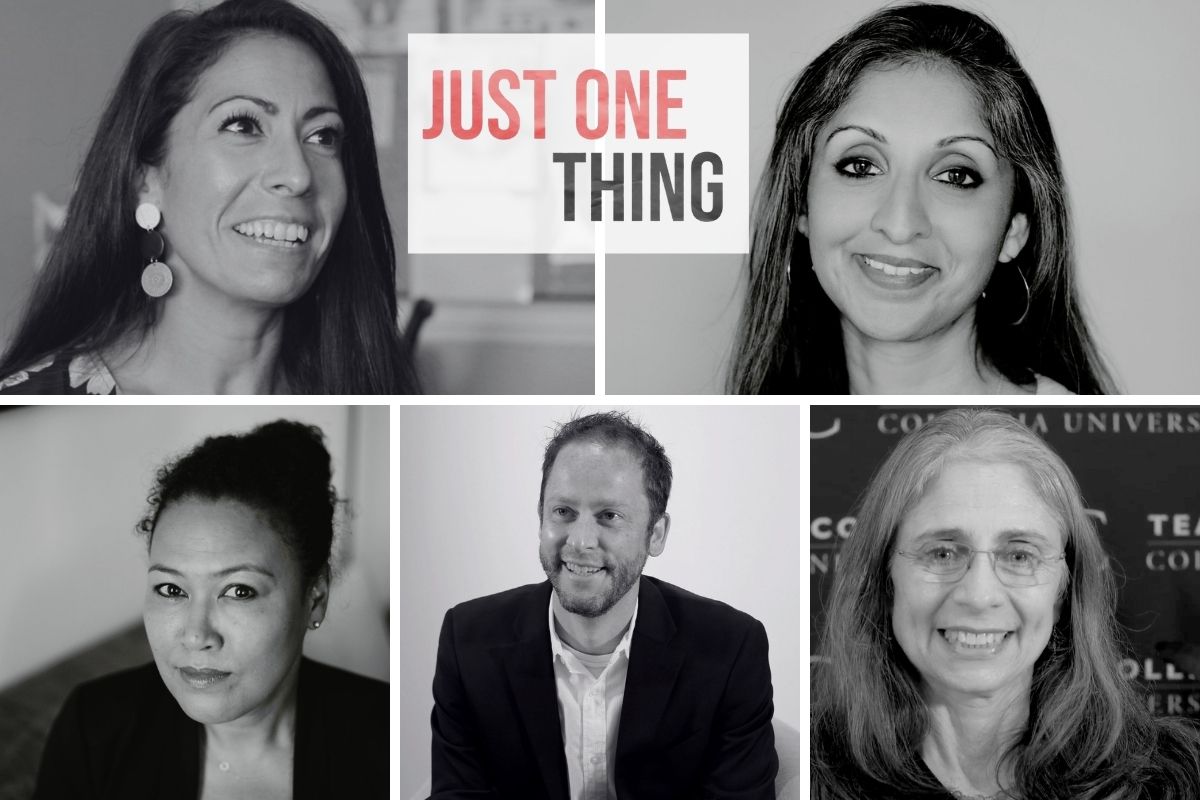“Just One Thing,” a recent video series from the Digital Futures Institute (DFI) that debuted on Sept. 28, in fact offers not one, but “Five Things to Remember” from Teachers College faculty on one thing that they’ve learned since March 2020, and that they want to make sure we don’t forget.
Audiences of the five episodes gained insight on equity and food access from Mary Swartz Rose Professor in Nutrition & Education Pam Koch; the future of telehealth from Associate Professor of Speech & Language Pathology Michelle Troche; reflections on post-pandemic learning from Associate Professor of Communication, Media and Learning Technology Design Nathan Holbert; the importance of informal interactions to sustaining difficult work from Associate Professor of Health Education Sonali Rajan; and how wandering can inspire curricula from Jacqueline Simmons, Vice Chair of Department of Curriculum & Teaching.
“We saw in the (‘Just One Thing’) pieces the ways the visual can tell different kinds of stories and provide different on-ramps in considering an experience that the entire world has lived through,” TC’s Lalitha Vasudevan said during a November roundtable discussion with the series’ contributors. “The journeys of inquiry and learning in the broadcasts truly reflected education in the broadest and most resilient sense of the word.”
Why Equitable Food Access Matters in 2021 and Beyond
A transformational initiative led by Vasudevan, DFI launched early this year in pursuit of a “dual mandate of service and scholarship, seeking, on the one hand, to improve the digital environment within TC while also making an impact in teaching, research and public engagement.” The initiative’s new video series builds on this ongoing work.
“We look forward to more collaborations in the future that similarly call attention to how scholarship wends its way beyond the boundaries of classrooms, clinics, curriculum, and the printed word.” Vasudevan said ahead of the release of “Just One Thing.”
DFI released new episodes weekly earlier this fall. “Academic journals and articles will be around forever,” but “Just One Thing” provides faculty with new scholarship tools to reach different audiences, says Joe Riina-Ferrie, DFI Producer and Educational Media Researcher. “A video can provide something an article cannot. Which isn't to say we want to replace articles. A video is just different.”
The faculty observations, as eclectic as the departments represented on the videos, revolve around the educational responses to the pandemic and thoughts on how those responses might benefit future learning.
“We're looking at a March 2020 to present timeframe,” said DFI Media Producer Jen Lee. “COVID brought a lot of change and uncertainty for everyone. To long for familiarity is only natural and as we move back toward familiarity, the series points to the importance of reflection and remembrance about what COVID taught us about society, systems and our own lives.”
As part of the roundtable discussion, Simmons credited her segment – “The Practice of Wandering and its Value in Curriculum Design” – with opening her to new possibilities in the pursuit of scholarship.
“The film-making was another way of presenting research and ways I would like people to start thinking about curricula,” she shared. “Film is a very useful modality. You can read about research in a paper or hear about it in a lecture. But film creates an emotional connection with authors in a way that is just not possible in a lecture.”
As an Associate Professor of Health Education, Rajan has immersed herself in the causes and prevention of gun violence. Rajan said the invitation from DFI to share her thoughts in a presentation called “How In-Person Connections Sustain Us” helped put the “challenging, sad and difficult issues” she considers each day in perspective.
“The video helped me articulate, in a way I’d been unable to do before, that the ability to do this kind of work and do it in a way that doesn’t consume me is because of the personal and collaborative nature of the work with my colleagues,” Rajan reflected.
Visit the Digital Futures Institute site to watch all five of the videos.
